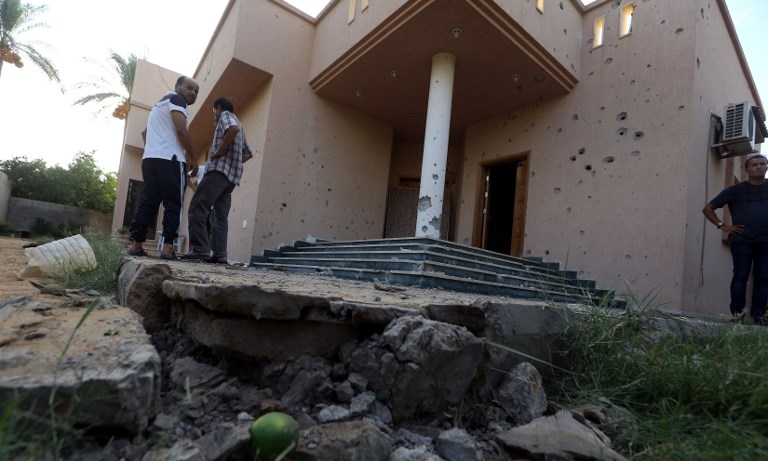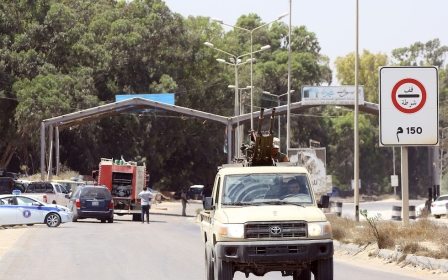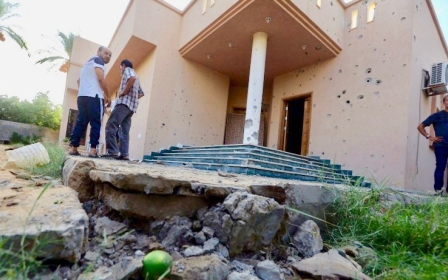What you need to know about fighting in Libya's capital

As chaos reigns in Libya, with competing authorities continuing to vie for power, the battle for Tripoli has started once again.
The latest round of clashes in Libya's capital have left at least 50 people dead, including 18 civilians, and over 130 people injured.
The fighting started on 27 August as rival armed groups vied for greater control of the city. Clashes stopped briefly as a truce was reached on 28 August, but it lasted for less than 24 hours.
Late on Monday, another UN-brokered ceasefire was announced.
This round of fighting was the latest in what have been regular clashes since the war over Tripoli started. The capital is a key strategic target because of its assets, including the Libyan Central Bank, and air and sea ports.
The latest clashes have laid bare the tenuous control that the internationally recognised and UN-backed Government of National Accord (GNA) has over the capital, with observers and residents fearing that security in the city could be compromised for some time to come.
Here’s a breakdown of what’s going on:
Who is fighting?
Following the 2011 revolution that toppled longtime leader Muammar Gaddafi, no one group has been able to seize control of the capital.
This has left successive governments having to work with representatives from multiple factions, and allow the groups to gain legitimacy by turning them into officially sanctioned units.
The latest fighting has pitted the Seventh Brigade, an armed group from the town of Tarhuna - to the southeast of Tripoli - against a coalition of armed brigades working under the interior ministry. The coalition includes the Tripoli Revolutionaries Brigade, Bab Tajoura Brigade, Nawasi Brigade, Ghnewa Brigade and Misrata’s 301 Brigade.
Misrata's 301 Brigade withdrew from the fighting, leaving only the Tripoli Brigades. These militias are run independently, but linked to the GNA.
The Seventh Brigade has said it launched the operation aiming to "cleanse" Tripoli of "corrupt militias, which used their influence to get bank credits worth millions of dollars while ordinary people sleep outside banks to get a few dinars".
For over a year, the brigade has been stationed in the southeastern Gasir Benghashir district of Tripoli, operating under the GNA’s defence ministry.
Large militias in Tripoli are not only deeply involved in criminal networks, but are heavily involved in big business, politics and have access to institutions.
According to a June report by the Small Arms Survey, a Geneva-based NGO, the government "is powerless in the face of militia influence".
Why is Tripoli important?
The capital is an important target for warring sides in the region, offering control over strategic assets such as the Libyan Central Bank, the air and sea ports in the city, as well as all other institutions.
Guma el-Gamaty, a Libyan academic and analyst, told Middle East Eye when the fighting first broke out: “Tripoli is important because it is where key institutions concerned with budgets and money are located.
“Some militias are flexing and using their military power to exploit such institutions for financial gains,” Gamaty said, adding that fighting between militias for Tripoli should be seen with this in mind as they are looking to access “easy money”.
Why can’t the GNA shut the militias down?
The GNA has relied on local militias to enforce law and order in the capital, as the UN-backed government has been unable to find a solution to the widespread arms in the country. Armed militias are in control of the airport.
Riccardo Fabiani, a geopolitical analyst at Energy Aspects, told MEE that the GNA is in a tough spot as a result of the arrangement it has with the militias that allow them to continue operating loosely under the UN-backed government.
"This is very different from a government exercising its monopoly on violence and imposing stability," he said. "Rather, it was an ad hoc arrangement that suited the UN-backed GNA because it enabled them to establish themselves in Tripoli and to pretend they were in control."
The GNA, as well as other transitional authorities, has tried and failed to integrate the armed forces into a regular army, relying on militias to ensure the capital’s security.
"The GNA can only sit on the sidelines and watch - they can't really go against the same militias that give them the illusion of control, because they have no power over them," Fabiani said.
"The situation in Tripoli is worrying, but it's hard to say what is happening is surprising. The relative stability of Tripoli was predicated on a handful of militias controlling the city and excluding other armed groups."
What's next?
Residents in Tripoli are worried about what the renewed fighting means. Many have shared images on social media of the effects of the violent clashes, with some claiming that numerous roads have been blocked off, forcing residents to look for alternative routes to their homes or relatives.
According to Fabiani, the violence will likely continue.
"The bottom line here is that more violence is likely, although it will come in bouts and will be irregular - even if the Tripoli militia cartel successfully repeals the current attack," he said referring to the group of militias fighting the Seventh Brigade.
Middle East Eye propose une couverture et une analyse indépendantes et incomparables du Moyen-Orient, de l’Afrique du Nord et d’autres régions du monde. Pour en savoir plus sur la reprise de ce contenu et les frais qui s’appliquent, veuillez remplir ce formulaire [en anglais]. Pour en savoir plus sur MEE, cliquez ici [en anglais].




